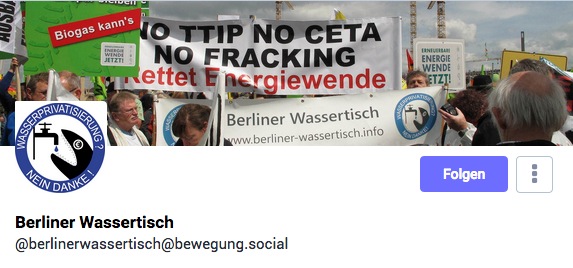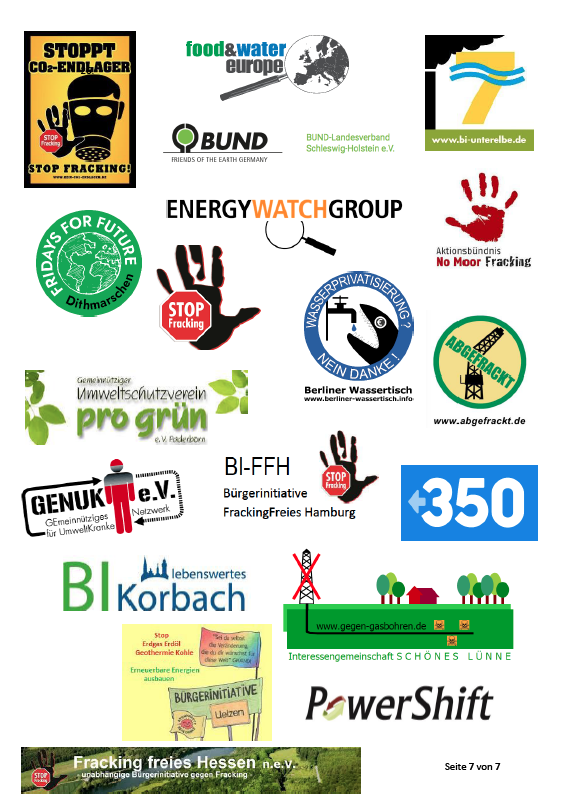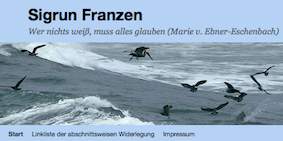Privatsphäre stärkt, Überwachung schwächt! #StopScanningMe


Suche

Schiefergas-Fracking in Deutschland?

#StopEUMercosur Erklärung
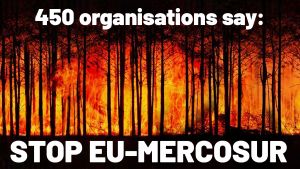
Aktion Greenpeace: #StopEUMercosur

#SaveTheOkavangoDelta
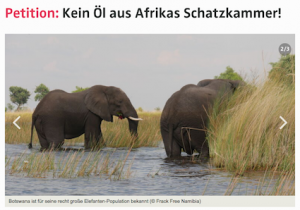
Erfolgreich! Über 1 Million Unterschriften „Green Deal“ – Europäische Bürgerinitiative (EBI)

Stop Energiecharta. #NoECT. Wir wollen raus aus dem Anti-Klimaschutz-Vertrag

Europäische Bürgerinitiative gegen biometrische Massenüberwachung (17.2.2021-17.2.2022)

Lebensgefährliche Entwicklung: Gewinnorientierung im Krankenhaus
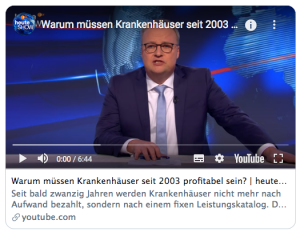
- Wassertisch-Plenum,
im NewYorck / Bethanien Mariannenplatz 2A
10997 Berlin Openstreetmap fällt coronabedingt aus Überblick (Messstellen: Oberflächengewässer und Grundwasser)


-
Letzte Beiträge
- AöW zum Weltwassertag 2023: Interkommunale Zusammenarbeit noch stärker ermöglichen
- Greenpeace: Fracking – eine unterirdisch schlechte Idee
- Bürgerinitiative gegen CO2-Endlager: Offener Brief an den Bundesminister für Wirtschaft und Klimaschutz Dr. Robert Habeck
- BUND gegen CCS-Endlager
- Jürgen Knirsch: CETA-Handelsabkommen: Eine trügerische Wette auf die Zukunft (Leserbrief an die SZ vom 8.12.2022)
- Neuere Materialien und Dokumente zur CETA-Debatte
- TAZ: Hamburger Abgeordneter über Olympia-Gedankenspiele: „Es kommt zu Vertreibungen“
- NDR: Bewirbt sich Hamburg noch einmal um Olympische Spiele?
- NGO-Bündnis fordert mit gemeinsamen Appell die Senkung des absoluten Ressourcenverbrauchs
- Allianz der öffentlichen Wasserwirtschaft warnt vor CETA: Mit dem jetzigen CETA-Text wird der Schutz der öffentlichen Wasserwirtschaft vor einer Kommerzialisierung weiter geschwächt
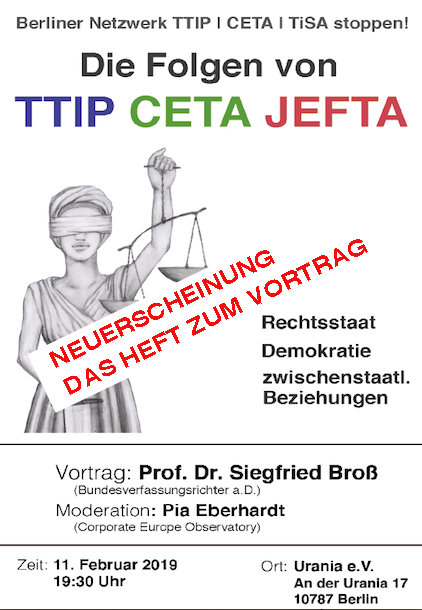
Delius-Klage
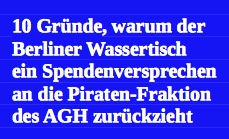
Keine Steuergelder für LNG-Fracking-Gas Terminals in Deutschland!

RSS-Feeds
Schlagwort-Archive: TPP
How The TPP Agreement Could Be Used To Undermine Free Speech And Fair Use In The US
Techdirt
30.3.2015
How The TPP Agreement Could Be Used To Undermine Free Speech And Fair Use In The US
From Mike Masnick
„[…] Wikileaks leaked the investment chapter, which is focused on corporate sovereignty provisions, officially known as „investor state dispute settlement“ or „ISDS“ (named as such, in part, because the negotiators know it sounds boring, so they hope the public won’t pay attention). As people go through the details and the fine print, they’re finding some serious problems with it. Sean Flynn has a very in-depth look at how the combination of these two chapters — the IP chapter and the investment chapter — could very likely threaten fair use (and, with it, undermine the First Amendment).[…]“
NaturFreunde Deutschlands warnen SPD vor TTIP und CETA
NaturFreunde Deutschland
31.3.2015
NaturFreunde Deutschlands warnen SPD vor TTIP und CETA
Berlin, 31. März 2015 – Die NaturFreunde Deutschlands warnen die SPD-Spitze davor,  weiterhin für die geplanten Freihandelsabkommen der Europäischen Union mit den USA (TTIP) beziehungsweise Kanada (CETA) zu werben. Schon heute sei ein erheblicher Vertrauensverlust bei vielen Menschen festzustellen, die sich für eine sozial-ökologische und nachhaltige Weltwirtschaft engagieren. „Die geplanten Freihandelabkommen führen zu weiterer Deregulierung zugunsten der Interessen großer Konzerne. Mit ihrer Hilfe sollen offenbar demokratische Entscheidungen ausgehebelt werden. Das geht zu Lasten der Parlamente und der Demokratie in den USA wie in Europa“, erklärt Eckart Kuhlwein, umweltpolitischer Sprecher des Verbandes.
weiterhin für die geplanten Freihandelsabkommen der Europäischen Union mit den USA (TTIP) beziehungsweise Kanada (CETA) zu werben. Schon heute sei ein erheblicher Vertrauensverlust bei vielen Menschen festzustellen, die sich für eine sozial-ökologische und nachhaltige Weltwirtschaft engagieren. „Die geplanten Freihandelabkommen führen zu weiterer Deregulierung zugunsten der Interessen großer Konzerne. Mit ihrer Hilfe sollen offenbar demokratische Entscheidungen ausgehebelt werden. Das geht zu Lasten der Parlamente und der Demokratie in den USA wie in Europa“, erklärt Eckart Kuhlwein, umweltpolitischer Sprecher des Verbandes.
Die Umweltexperten der NaturFreunde Deutschlands werfen den TTIP-Verfechtern vor, mit der Freihandels-Ideologie die soziale Ungleichheit zu vergrößern, die Spaltung Europas zu vertiefen und gleichzeitig die Ökologie an den Rand zu drängen. Bei der Lektüre der bisher vorliegenden Texte werde schnell klar, dass es weniger um Handel und eine gute Partnerschaft gehe, als um Deregulierung, Liberalisierung und den Ausverkauf öffentlicher Gesundheits- und Bildungsleistungen sowie der Wasser und Energieversorgung an multinationale Konzerne. Damit würden auch die Bemühungen um die Rekommunalisierung von Dienstleistungen unterlaufen.
Besonders kritisch sehen die NaturFreunde Deutschlands die „regulatorische Harmonisierung“: Gegenseitige Anerkennung von Standards würde bedeuten, dass die niedrigsten Standards gelten könnten. Das EU-Vorsorgeprinzip sei in Gefahr, da es mit dem in den USA geltenden Nachsorgeprinzip nicht zu vereinbaren sei. Eine regulatorische Kooperation schon im Vorfeld der Gesetzgebung höhle das demokratische Prinzip aus und könne aus Furcht vor Schadensersatzforderungen Gesetze verhindern. Schließlich führten die vorgesehenen Investor-Staat-Schiedsgerichte zu einer Paralleljustiz, die unserem Grundgesetz widerspreche.
Viele Entwicklungs- und Schwellenländer würden unter dem neuen Freihandelsmonopol leiden. Dabei habe die SPD gerade erst in ihrem Europa-Programm beschlossen, die europäische Entwicklungszusammenarbeit müsse künftig noch stärker darauf setzen, Fluchtursachen zu bekämpfen.
Die NaturFreunde Deutschlands unterstützten den Parteikonvent der SPD, der im vergangenen September „rote Linien“ für die transatlantischen Freihandelsgespräche beschlossen hatte. Viele Äußerungen aus der SPD-Parteispitze legten jedoch den Verdacht nahe, dass Deutschland in die falsche Richtung marschieren werde. „Die SPD muss endlich die Debatte über die Ausgestaltung der Globalisierung jenseits des Neoliberalismus führen. Das wäre eine Chance, um die unser Land und die EU so lähmende Entpolitisierung zu überwinden. Und würde auch der SPD wieder Profil geben“, so Eckart Kuhlwein.
Rückfragen bitte an
NaturFreunde Deutschlands
Eckart Kuhlwein
Bundesfachbereichsleiter Naturschutz, Umwelt & sanfter Tourismus
(0173) 610 69 33
kuhlwein@naturfreunde.de
www.presse.naturfreunde.de
Pressemitteilung als pdf
TPP Leak zeigt: ISDS wird so schlimm wie befürchtet
Heise
27.3.2015
Handelsabkommen TPP: Schiedsgerichte gegen Copyright-Schranken
Von Stefan Krempl
Wikileaks hat das geheime Kapitel* zu privaten Schiedsgerichten für den Investorenschutz (ISDS) im geplanten Handelsabkommen Trans-Pacific Partnership (TPP) veröffentlicht. Es bestätigt die Befürchtungen der Kritiker.
Das umstrittene Kapitel für ein Schiedsverfahren zum Investorenschutz (ISDS) im geplanten Handelsabkommen Trans-Pacific Partnership sollte eigentlich auch nach Abschluss des Abkommens geheim bleiben. Doch jetzt hat Wikileaks den 55-seitigen Entwurf mit Stand Januar veröffentlicht. Das Papier untermauert Bedenken, dass Konzerne über ein privates Schiedsgericht auch gegen Regeln im Patent- oder Urheberrecht der angeschlossenen Staaten vorgehen könnten.
Zum Artikel
*Zum Originaldokument: Trans-Pacific Partnership Agreement (TPP) – Investment chapter
Wikileaks
25.3.2015
„Secret Trans-Pacific Partnership Agreement (TPP) – Investment Chapter“.
WikiLeaks releases today the „Investment Chapter“ from the secret negotiations of the TPP (Trans-Pacific Partnership) agreement. The document adds to the previous WikiLeaks publications of the chapters for Intellectual Property Rights (November 2013) and the Environment (January 2014).
The TPP Investment Chapter, published today, is dated 20 J anuary 2015. The document is classified and supposed to be kept secret for four years after the entry into force of the TPP agreement or, if no agreement is reached, for four years from the close of the negotiations.
anuary 2015. The document is classified and supposed to be kept secret for four years after the entry into force of the TPP agreement or, if no agreement is reached, for four years from the close of the negotiations.
Julian Assange, WikiLeaks editor said: „The TPP has developed in secret an unaccountable supranational court for multinationals to sue states. This system is a challenge to parliamentary and judicial sovereignty. Similar tribunals have already been shown to chill the adoption of sane environmental protection, public health and public transport policies.“
Current TPP negotiation member states are the United States, Japan, Mexico, Canada, Australia, Malaysia, Chile, Singapore, Peru, Vietnam, New Zealand and Brunei. The TPP is the largest economic treaty in history, including countries that represent more than 40 per cent of the world´s GDP.
The Investment Chapter highlights the intent of the TPP negotiating parties, led by the United States, to increase the power of global corporations by creating a supra-national court, or tribunal, where foreign firms can „sue“ states and obtain taxpayer compensation for „expected future profits“. These investor-state dispute settlement (ISDS) tribunals are designed to overrule the national court systems. ISDS tribunals introduce a mechanism by which multinational corporations can force governments to pay compensation if the tribunal states that a country’s laws or policies affect the company’s claimed future profits. In return, states hope that multinationals will invest more. Similar mechanisms have already been used. For example, US tobacco company Phillip Morris used one such tribunal to sue Australia (June 2011 – ongoing) for mandating plain packaging of tobacco products on public health grounds; and by the oil giant Chevron against Ecuador in an attempt to evade a multi-billion-dollar compensation ruling for polluting the environment. The threat of future lawsuits chilled environmental and other legislation in Canada after it was sued by pesticide companies in 2008/9. ISDS tribunals are often held in secret, have no appeal mechanism, do not subordinate themselves to human rights laws or the public interest, and have few means by which other affected parties can make representations.
The TPP negotiations have been ongoing in secrecy for five years and are now in their final stages. In the United States the Obama administration plans to „fast-track“ the treaty through Congress without the ability of elected officials to discuss or vote on individual measures. This has met growing opposition as a result of increased public scrutiny following WikiLeaks‘ earlier releases of documents from the negotiations.
The TPP is set to be the forerunner to an equally secret agreement between the US and EU, the TTIP (Transatlantic Trade and Investment Partnership).
Negotiations for the TTIP were initiated by the Obama administration in January 2013. Combined, the TPP and TTIP will cover more than 60 per cent of global GDP. The third treaty of the same kind, also negotiated in secrecy is TISA, on trade in services, including the financial and health sectors. It covers 50 countries, including the US and all EU countries. WikiLeaks released the secret draft text of the TISA’s financial annex in June 2014.
All these agreements on so-called “free trade” are negotiated outside the World Trade Organization’s (WTO) framework. Conspicuously absent from the countries involved in these agreements are the BRICs countries of Brazil, Russia, India and China. Zum Artikel
Neuer TTIP-Leak zeigt, dass kommunale Daseinsvorsorge nicht aus dem Freihandelsabkommen herausgenommen wurde
Es wurden weitere TTIP-Unterlagen geleakt. Dazu erschienen einige Beiträge:
COMPUTERWORLD UK
13.06.2014
TTIP Update XXVIII
Von Glyn Moody
The big news this week is an important leak detailing what the European Commission will offer the US in the fields of services and investment. It’s super fresh: the document is currently being circulated to the governments of the EU’s Member States, and comments remain open until 30 June, so we are gaining important insights into real-time discussions that have hitherto been completely hidden from us.
[…]
It turns out that TISA forms a kind of unholy trinity together with TTIP and the Trans-Pacific Partnership agreement (TPP). Between the three of them, they aim to define the terms for world trade for the coming years: TTIP covers transatlantic trade and investment, TPP the transpacific trade, and TISA global trade in services. TISA involves around 50 countries including the European Union. What TTIP, TPP and TISA have in common is the US, which seeks to use these three treaties to cement its position as they key player in trade and services. The idea is obviously to set the terms for those before China takes over as the world’s biggest economy.
zum Artikel…
Auch
European Federation of Public Service Unions (EPSU) hat am 13. Juni einen Beitrag dazu verfasst:
Leaked documents TTIP reveal substantial EU commitments, public services not excluded

zum Artikel
Hier ist außerdem eine Zusammenfassung mit weiterführenden Links von Liese Müller.
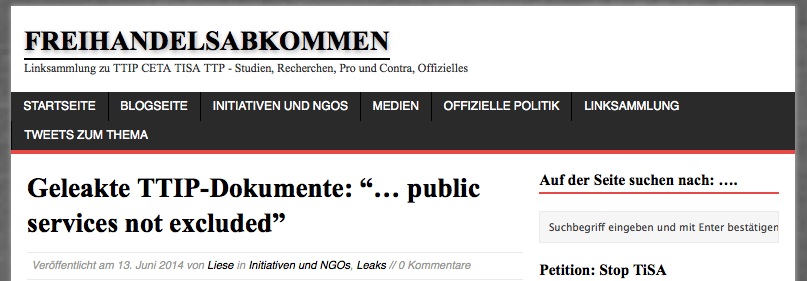

 Pressemitteilungen
Pressemitteilungen